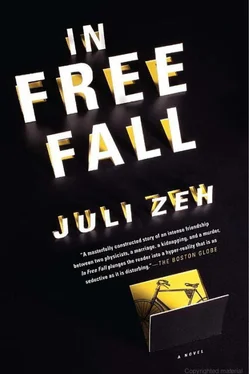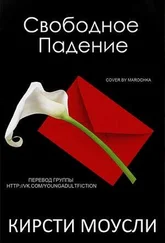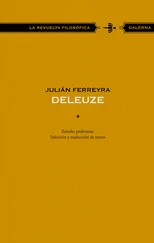“So you end up writing something for Der Spiegel ,” says Oskar, “that goes even beyond the ideas of this lunatic.”
“Is an insane person automatically wrong? That’s news to me.”
“What’s driving you isn’t even insanity. It’s your desire to relativize a personal reality.” Oskar casts the words into the room over his shoulder.
“Be quiet,” Sebastian hisses. “That’s enough.”
At the far end of the dining room, Maike is leaning over and holding Liam by the wrists. She is talking to him and pulling him toward her, and he is turning his head this way and that. Her hair is hanging over her forehead as she looks up at Sebastian, smiling.
“I know just what you’re talking about,” she calls. “The parallel universe in which Liam is not refusing to set the table.”
“Exactly,” Sebastian says genially.
“And a universe in which Oskar doesn’t stare so angrily.”
“Let’s hope so.”
“And perhaps even one in which I am not your wife and Liam is not your son?”
Maike laughs because Sebastian looks put out. The potential semi-orphan of a parallel universe has pulled himself free and is running past the table. He disappears into the hall, with Maike in hot pursuit.
“You long for other worlds,” Oskar says in a low voice. “For the notion that you might be able to be two different men at the same time. At least.”
Sebastian forces himself to let go of the curtain he has been fingering all this time and has wanted more than anything to pull off the rail in one violent tug. Oskar’s hand passes over his shoulder as he tosses his cigarette butt out of the window. Bonnie and Clyde race across two ripples, only to prod the sinking butt with their beaks, disappointed.
“Do you remember the world in which you said this to me?” asks Oskar: “‘I want to be the ground that trembles beneath your feet when the gods take their revenge on you’?” As he quotes his friend, two lines appear around his mouth—brackets of irony.
Sebastian has not forgotten—of course not. He said those words on the night that he and Oskar, with the help of a bottle of whiskey, had cracked Little Red Riding Hood’s assignment on dark energy. The chairs had been upended on the tables in the bar by that time, and the bartender had smoked his way through five cigarettes while waiting for them to leave. But the two of them had seen and heard nothing else—their eyes had been closed and their foreheads pressed together as their shadows on the wall accepted the Nobel Prize for the year 2020. That evening, over the talk of numbers, they had grown closer than ever before. Their minds had worked so perfectly together that they might have belonged to the same being. Sebastian had lifted two fingers to touch his friend on the cheek, and said the words that had come into his head: I want to be the ground that trembles beneath your feet …
“Not long after,” Oskar says, “I heard something quite different from you.”
Sebastian remembers that, too. “You overestimate your own importance,” he had screamed at Oskar in his room. “You overestimate your own importance in general, and you overestimate your importance to me in particular!”
Oskar’s aesthetic sense demands that he appreciate the sophistication of an attack, even one against himself. He had admired the precise sequence of behavior aimed at cultivating trust ( I want to be the ground …) and the deadly blow ( You overestimate …), so he simply stayed in his armchair and did nothing more than watch casually as Sebastian worked himself up.
“So many worlds,” Oskar says now. “Sometimes I wish I could find a way of diverting you from that path.”
“You’re exaggerating.”
“You used to be a good physicist before you went off course.”
“I haven’t gone off course,” Sebastian says with utmost composure. “I have simply not recognized the Copenhagen Interpretation as a final, binding truth. Even it is a point of view, Oskar. Not a religion.”
“Not a religion, no. It is science. Quite the opposite of your Many-Worlds escapades.”
“Let’s be clear on one thing. I was not defending the Many-Worlds Interpretation in Der Spiegel , only explaining it. Because I had been asked to.”
“If you’re not even defending this garbage, that only shows cowardice on top of stupidity.”
“Enough now.”
“You need a good shake to wake you up. A slap in the face to bring you back to reality.”
“What,” Sebastian asks insolently, “is reality?”
“Everything,” Oskar says, suddenly touching Sebastian’s stomach with the back of his hand, “that is open to experiment.”
Sebastian raises an arm helplessly, and lets it drop to his side again. His eyes flit from Oskar’s profile to a pigeon fluttering upward, immediately disappearing from sight. His drooping shoulders and bent head signal capitulation. But Oskar does not notice. He has turned away, placed both hands on the windowsill, and is talking again.
“Perhaps you’ve read Orwell’s 1984 . In Oceania, people learn under torture to see things as both real and unreal at the same time. They are forced to see only one possibility out of many. Do you know what Orwell called that?” Without looking around, Oskar makes a sudden grab for Sebastian. “Do you?”
Sebastian looks at the fingers wrapped around his wrist. In a moment, he and Oskar will look each other straight in the eye for the first time that evening. Neither will be able to tear his gaze away for a few seconds. Oskar’s face will relax. Then he will hurriedly take out another cigarette and light it in silence.
The ground beneath their feet begins to tremble as Liam runs noisily into the room. He throws himself headlong against Oskar, wrapping his arms around his hips and placing a sock-clad foot on each of Oskar’s polished Budapest shoes. Oskar’s fingers have let go of his friend’s wrist very quickly.
“Are you going to lay into me the whole evening simply because I’ve been in Der Spiegel ?” Sebastian asks.
“With a photo, too,” says Liam.
“ Mais non .” As Oskar strokes Liam’s head, single hairs stand up, following the static electric charge in his hands. “I will enjoy being a visitor in your life, as I always do.”
They exchange a fleeting glance while Liam tugs at Oskar’s sweater to get him moving.
“Come on, quantum feet!” he shouts, smiling when Oskar laughs. They sway toward the table, a two-headed creature with only one pair of legs.
“By the way,” Oskar says, turning his head to speak to Sebastian over his shoulder, “I have something for you. An official duel.”
He walks Liam around the table an extra time, then lets Maike—who is sticking candles into holders—tell him where to sit, even though he knows already.
“A duel,” Sebastian murmurs, still standing by the window. “And I know who will be choosing the weapons.”
He looks up into the chestnut trees where the sparrows are chirping, and wonders if the twittering would translate into human language if it were recorded and played backward. Endless talk. A novel per bird, per day.
MAIKE SERVES ROCKET SALAD FROM A BOWL; her long arms are marked with tan lines from wearing a short-sleeved top in the sun. She blows a strand of hair off her forehead and gives Oskar a pleading look.
“How’s it going with the particle accelerator?”
“Oh, Maik.”
The first time he met her, Oskar refused to use the final vowel in Maike’s name: since then, he has stuck to this short form. Every time Maike’s eyes meet his, their faces brighten in mutual mockery. A casual observer might even think they were secretly in love.
Читать дальше












